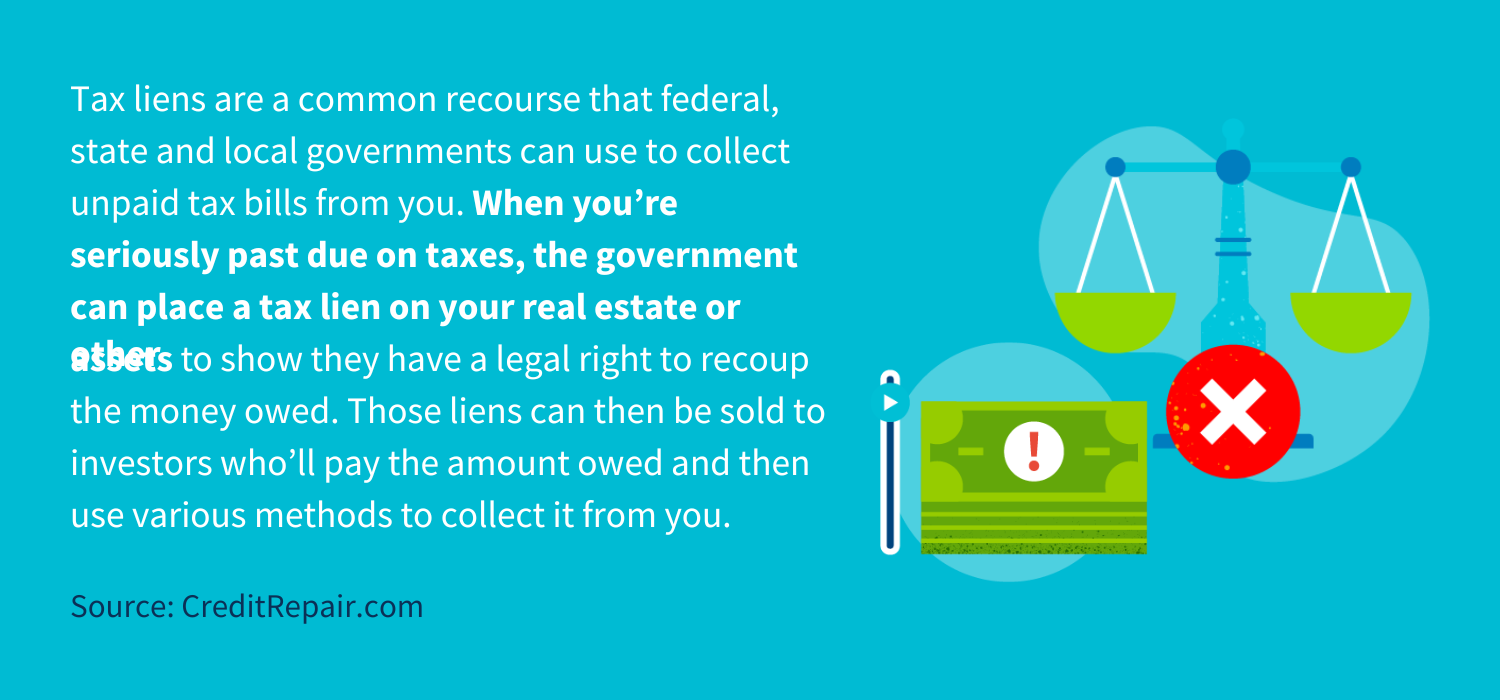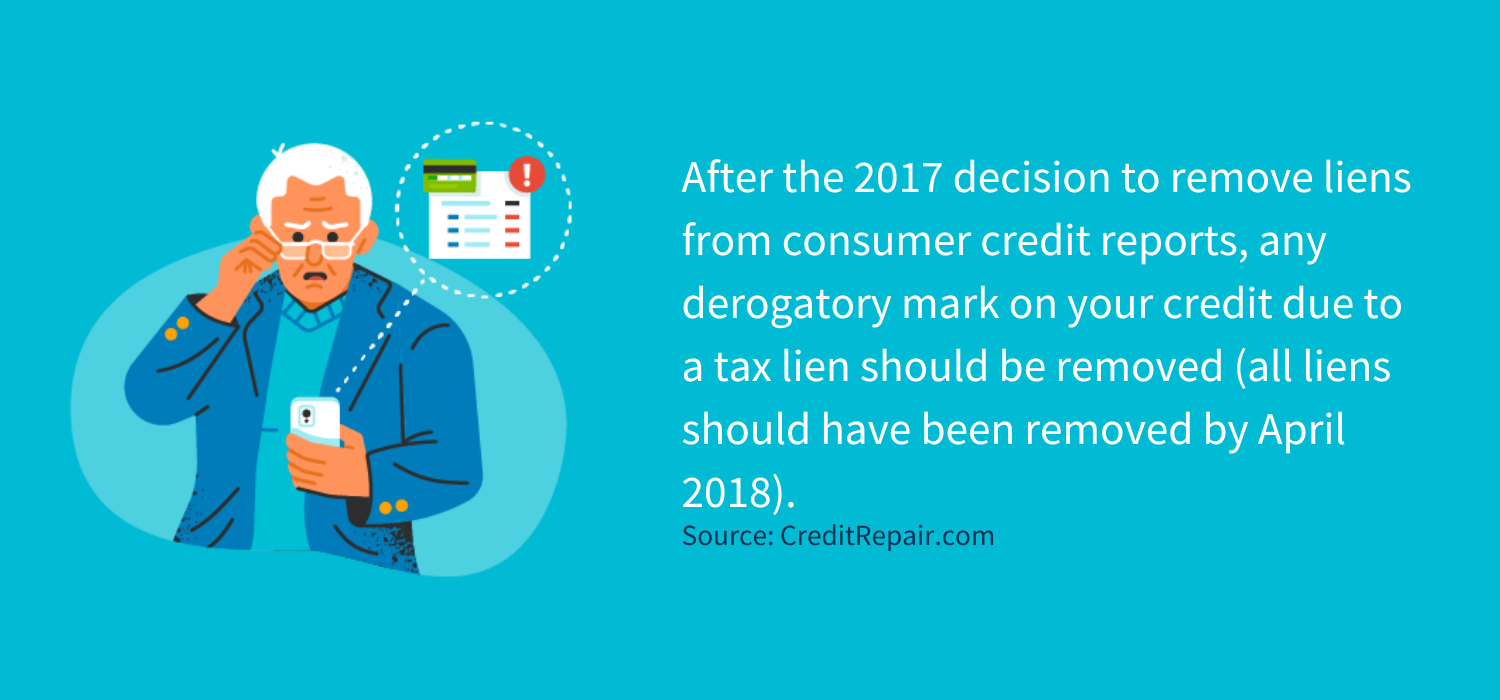
Disclosure regarding our editorial content standards.
If you’re worried about how a tax lien on your credit report will affect your credit, there’s good news. As of 2018, all tax liens were removed from consumer credit reports by the three major reporting agencies, Equifax®, Experian® and TransUnion®.
These new standards were part of a push to make sure the accuracy of credit reports and make accessing credit information easier for consumers.
What are tax liens?

Tax liens are a common recourse that federal, state and local governments can use to collect unpaid tax bills from you. When you’re seriously past due on taxes, the government can place a tax lien on your real estate or other assets to show they have a legal right to recoup the money owed. Those liens can then be sold to investors who’ll pay the amount owed and then use various methods to collect it from you.
How do tax liens affect your credit?
The short answer is that they don’t: tax liens are not included on credit reports.
According to the Consumer Financial Protection Bureau, the three major credit bureaus started removing tax liens and civil judgments from credit reports in July 2017 as part of the National Consumer Assistance Plan (NCAP).
Due to the changes brought about by the NCAP, property liens or tax liens are no longer included on your credit report and should have no effect on your credit score.
However, If the lien remains unpaid, you could receive a tax levy in which your wages can be garnished or bank accounts and other assets seized. This is a different situation and may seriously affect your creditworthiness.
So how will the removal of tax liens from your credit report affect your credit score? According to the Wall Street Journal, the more than 5.5 million liens that have been removed from consumer credit reports since the settlement have increased the loan approval odds for many Americans.
What public records can be on your credit report?
Due to the removal of civil judgments and liens, the only public records shown on your credit report now are bankruptcies. This is especially beneficial if the only negative marks on your credit report were due to a tax lien or civil judgment. Lenders will no longer have access to this personal information, and their decisions won’t be based on any government liens against you.
However, since bankruptcy can stay on your credit report for up to 10 years, it will still result in a significantly lower credit score, even if your tax liens are no longer listed. That’s why credit repair programs are a better option than bankruptcy, since creditors will see that you are making strides in paying down your debt instead of canceling it.
What to do if a tax lien is on your credit report

After the 2017 decision to remove liens from consumer credit reports, any derogatory mark on your credit due to a tax lien should be removed (all liens should have been removed by April 2018). The quicker this happens, the better off you’ll be, especially if you’re in the process of applying for a car loan, mortgage or other major investment.
This is why it’s important to monitor your credit and file a dispute with the credit bureau if a tax lien on a credit report is listed. Since such disputes often take some time to make any noticeable change to your overall credit score, getting this part done early is essential if you plan to apply for credit in the near future.
In many cases, filing a dispute is a painless process and can have an impact on your credit score. Depending on the amount you owe, you could see your credit score raised through the simple task of disputing a tax lien that shouldn’t be showing up in the first place.
Keep in mind that people with tax liens often have other financial challenges as well, so how much your score could improve will be more of a function of other items, like payment history and credit utilization.
How to check your credit report and correct errors
As laws continue to require transparency and make it easier for consumers to monitor their credit, there are multiple ways to correct errors that could be lowering your score.
The first step to doing this is to get your credit report from all three credit bureaus. You can access all three reports from AnnualCreditReport.com or get information about how to request a free credit report once a year on the USA.gov website.
Many credit card companies and banks now also feature free credit monitoring services, which include access to all your credit reports.
Monitoring your credit consistently will help you in multiple ways:
- You’ll be made aware of anyone attempting to steal your identity or use your name for fraudulent credit card transactions and loans.
- You’ll see any hard inquiries made using your name and Social Security number.
- You’ll have a better snapshot of your financial health to focus on both small and large steps that can be taken to make it better.
- You’ll see what potential lenders see, including your payment history and the balances of your credit accounts and loans.
- Besides being a smart financial move, keeping up with what’s on your credit report will make sure you’re focused on raising your credit score and repairing what can be fixed.
You can also work with the advisors at CreditRepair.com to get your credit score and learn ways to pay down your debts and set a better course for your future financial path. We can help challenge and dispute inaccurate derogatory marks on your credit, including any tax liens on a credit report that shouldn’t be there.
We also provide personalized education on how to maintain a strong credit score over time, lower interest rates you’re already paying and become debt-free to achieve greater financial success.
Note: The information provided on CreditRepair.com does not, and is not intended to, act as legal, financial or credit advice; instead, it is for general informational purposes only.
Questions about credit repair?
Chat with an expert: 1-800-255-0263






